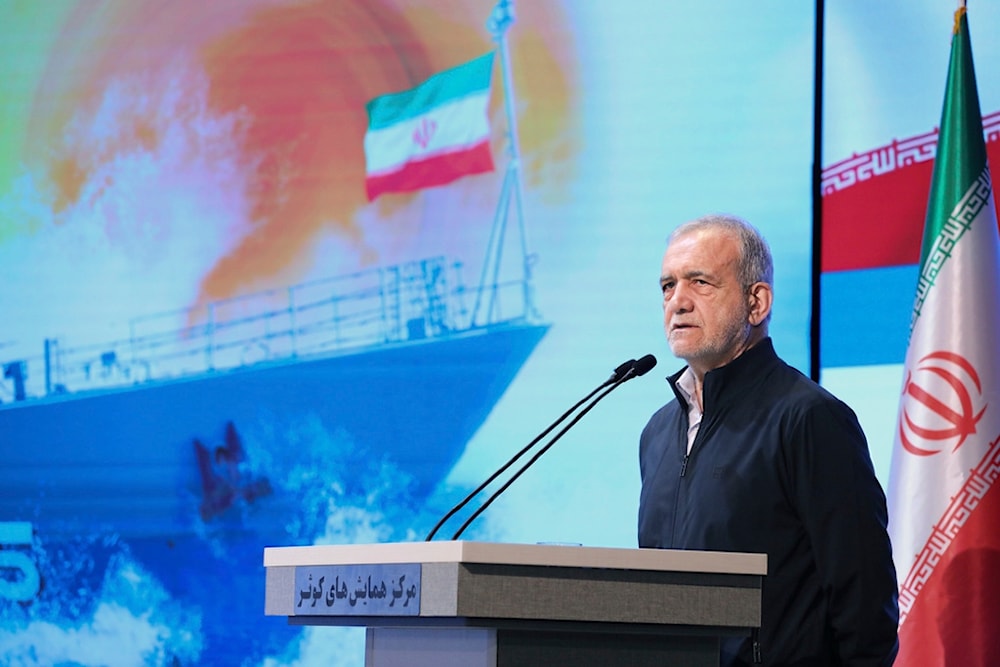At TDF, Iran's Pezeshkian, Araghchi urge regional self-determination
The top officials have reaffirmed Iran’s nuclear transparency, condemned "Israel's" crimes in Gaza, and called for regional sovereignty and fair global engagement.
-

In this photo released by the Iranian Presidency Office, President Masoud Pezeshkian speaks to navy officials, in Tehran, Iran, Saturday, May 17, 2025 (Iranian Presidency Office via AP)
Iranian President Masoud Pezeshkian strongly defended Iran’s peaceful nuclear policy, affirming the country’s right to pursue nuclear technology strictly for civilian purposes.
At the Tehran Dialogue Forum 2025, he emphasized that Iran’s nuclear advancements serve critical sectors such as health, agriculture, and industry, not warfare.
Pezeshkian reiterated that Iran’s religious and ethical principles strictly prohibit the development of nuclear weapons, stating that such arms contradict both Islamic principles and human conscience.
Responding to Western accusations, he said, “Others continue to claim that Iran is pursuing nuclear weapons. These are nothing but baseless, warmongering allegations.”
He added, “Even the US President said, ‘We must make sure Iran doesn’t have nuclear weapons.’ Fine — let them come and verify. We have nothing to hide. We are neither pursuing nor believe in building nuclear weapons.”
Read more: Iran reaffirms right to peaceful nuclear program, vows not to bow
Pezeshkian condemns 'Israel's' actions, urges global response
Turning to the situation in occupied Palestine, Pezeshkian condemned "Israel's" crimes in Gaza, particularly the killing of women and children. He urged Muslim nations and the broader international community to take a firm stand against injustice and inhumanity.
“If people remain silent in the face of oppression,” he warned, “they must question their commitment to Islam and humanity.”
He concluded, “As a free human being, I do not accept any form of coercion. Neither I, nor any free person in this country or region accepts threats and bullying. Free nations will never bow to force.”
Read more: Pezeshkian hits back at Trump: US can only dream of Iran’s surrender
Araghchi stresses sanctions relief and regional sovereignty
On his part, Iranian Foreign Minister Abbas Araghchi echoed Pezeshkain's message, describing the current global climate as dominated by hegemonic powers seeking to impose their agendas on the region.
He called for “a more effective path,” rooted in mutual respect, particularly toward emerging nations, and stressed Iran’s commitment to development and prosperity for its neighbors.
Reiterating Iran’s stance on nuclear transparency, Araghchi affirmed, “Iran has consistently affirmed that it does not seek nuclear weapons.” He called for “a fair and just agreement that safeguards Tehran's national interests and leads to the lifting of sanctions.”
“Iran remains committed to the Treaty on the Non-Proliferation of Nuclear Weapons,” he said, adding that Iran has never sought nuclear arms and opposes the production or use of weapons of mass destruction.
Araghchi emphasized that Iran has consistently worked to address international concerns transparently and within legal frameworks, calling for “a fair and balanced agreement within the framework of the Non-Proliferation Treaty, with full respect for Iran’s nuclear rights.”
On sanctions, he stressed, “Iran is committed to diplomacy and expects the unjust and unilateral sanctions targeting its people to be lifted.”
Read more: Iran dismisses claims of US proposals, reaffirms commitment to rights
Vision of balanced diplomacy and South-South cooperation
Araghchi emphasized that decisions should be made in regional capitals, not dictated from abroad.
“Regional states are capable of determining their own needs and must play an active role in shaping events, not merely implementing decisions made by others,” he said.
Addressing the Palestinian cause, Araghchi called "Israel" a threat to regional stability and urged a genuine resolution to the Palestinian issue through a democratic referendum that allows Palestinians to determine their own future.
He concluded by reaffirming that Iran’s nuclear policy and regional stance are based on balance, realism, and a commitment to deeper cooperation with neighboring states and the Global South.
Tehran Dialogue Forum 2025 draws 200 delegations from 53 countries
The Tehran Dialogue Forum took place under the theme “Dialogues for Regional and International Consensus and Integration,” drawing 200 delegations from 53 countries, including senior officials and representatives from the United Nations.
Among the key topics discussed were sanctions relief, nuclear disarmament in the Middle East, and broader efforts to eliminate weapons of mass destruction.
The two-day conference is a key platform for multilateral diplomacy and strategic dialogue on global challenges.
The forum officially commenced on Sunday morning in the Iranian capital with the participation of President Masoud Pezeshkian and Foreign Minister Abbas Araqchi.
Read more: Trump says US close to a nuclear deal with Iran
High-level foreign officials attend TDF
Among the prominent international delegates in Tehran were Oman’s Foreign Minister Badr Albusaidi, Tajikistan’s Foreign Minister Sirojiddin Muhriddin, Afghanistan’s caretaker government Foreign Minister Amir Khan Muttaqi, Prime Minister of the Kurdistan Region of Iraq Nechirvan Barzani, and Secretary of Armenia’s Security Council Armen Grigoryan.
Also in attendance were Iranian strategic figures, including Kamal Kharrazi, head of Iran’s Strategic Council on Foreign Relations, and former Foreign Minister Mohammad Javad Zarif. The event also gathered ambassadors and diplomatic representatives based in Tehran.
The forum features speeches by top Iranian officials, as well as foreign dignitaries, think tank leaders, and international policy experts.
Discussions will also center on critical regional and global issues, including cooperation, integration, and responses to ongoing geopolitical shifts.
Read more: Trump remarks 'so low', 'source of disgrace to US': Sayyed Khamenei

 5 Min Read
5 Min Read










